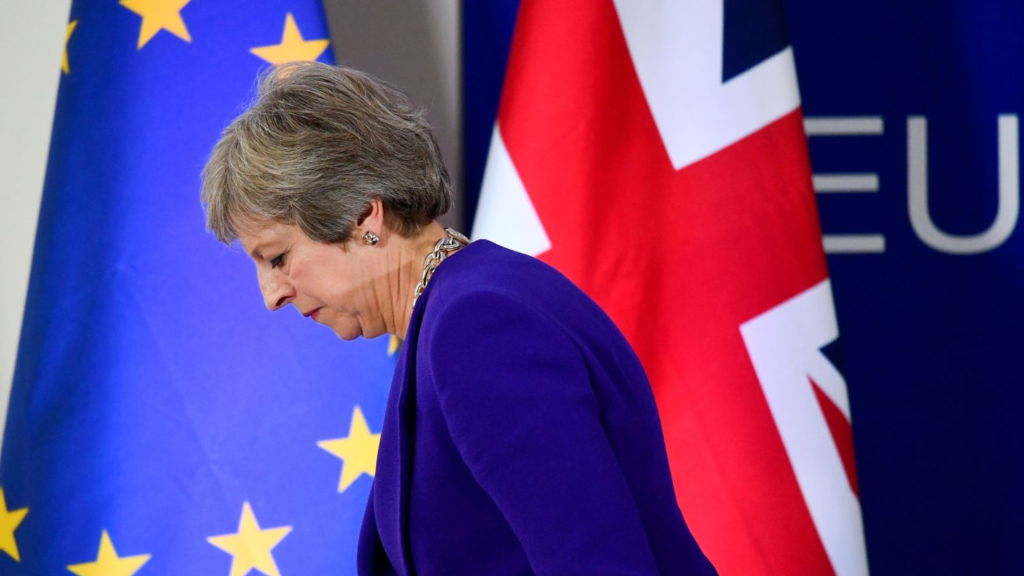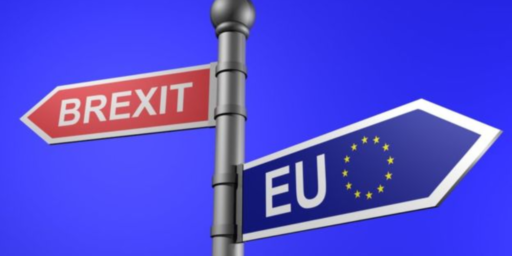Europe’s Highest Court Opens A Brexit Escape Hatch For Great Britain
Europe's highest Court appeared to hand the United Kingdom a way of escaping Brexit altogether if it chose to go that route. This will greatly complicate the domestic political situation for Theresa May.

The European Union’s highest court appeared to have opened something of an escape hatch for the United Kingdom with regard to the increasingly imperiled Brexit process even as British Prime Minister struggles to obtain approval for her Brexit plan while keeping her increasingly fragile governing coalition together:
BRUSSELS — The European Union’s highest court ruled on Monday that Britain could unilaterally reverse its decision to split from the 28-nation political bloc, in a ruling that gave a boost to anti-Brexit campaigners.
The decision, which came a day before the British parliament is set to vote on Prime Minister Theresa May’s deeply unpopular Brexit deal, made clear that Britain has the ability to reverse itself any time before the March 29 deadline to leave the European Union. There had been a legal question about whether a reversal would require the consent of the other 27 E.U. members, but the binding decision made clear that little stands in London’s way — should it want to return.
“The United Kingdom is free to revoke unilaterally the notification of its intention to withdraw from the E.U.,” the European Court of Justice said in its announcement.
The Brexit deal, which was unveiled last month and obeys the red lines set out by May and E.U. negotiators, has attracted little support from any part of Britain’s squabbling political spectrum. Pro-Brexit hard-liners say it keeps their country unacceptably entangled inside the E.U. market. Pro-E. U. campaigners say it would inflict major harm on the British economy and strip Britain’s voice in European decision-making while offering little benefit to the country.
The British press on Monday reported that it appeared so likely to go down in major defeat that May was debating whether to delay the vote, although it was unclear what she could offer to change minds.
The British government said in a statement that the ruling did not change their plans to pull Britain out of the European Union.
“This does not change the government’s firm policy,” the statement said. “The British people gave a clear instruction to leave, and we are delivering on that instruction.”
The decision fueled demands in Britain for a second referendum that could reverse the June 2016 vote to leave the European Union.
The court rejected arguments from both the British government and the European Commission that other countries would need a say in the reversal. The ruling also said that if E.U. leaders grant Britain an extension period after March 29 to keep negotiating, the British about-face could take place during that time too.
British advocates of remaining in the European Union reveled in the decision.
“It’s a huge and game-changing moment, clarifying definitively that the British people have real choices about Brexit — and that we can still determine our own destiny,” wrote two pro-E. U. British members of parliament, Chris Leslie and Tom Brake, in an opinion post published on HuffPost UK.
Scottish First Minister Nicola Sturgeon, who has warned she could try to lead Scotland out of the United Kingdom and back into the European Union, also embraced the ruling.
“So an extension of Article 50 to allow time for another vote, followed by revocation of Article 50 if the outcome is Remain seems to be an option that is now open to the House of Commons,” she wrote on Twitter, referencing the section of European treaties that creates a two-year clock for a country’s leaving the European Union.
Even though the ruling eased the way for Britain to stay in the European Union, it was unlikely to be welcomed wholeheartedly by pro-E. U. leaders in countries such as France and Germany. European leaders are frustrated after more than two years of what they see as British-generated political chaos, and leaders have previously said that if Britain stayed an E.U. member, they would like to take away the list of opt-outs and rebates that British leaders had demanded over decades. The court ruling would allow all that to stay in place.
As noted, this ruling comes just a day before the House of Commons was scheduled to vote on the controversial Brexit deal that Prime Minister Theresa May had reached with European Union negotiators was scheduled to take place. As it stood, head counts indicated that the vote would be problematic for May’s government and that she would likely face a situation where her hold on power would be under serious threat due to a major legislative defeat on the agenda item that has defined her time in office. That could lead to either a challenge to her as head of the Conservative Party and yet another new Prime Minister since the 2015 General Election or even the collapse of the Tory Government altogether, necessitating a new election just months before the currently scheduled Brexit deadline at the end of March. Taking this into account, it should come as no surprise that May has decided to postpone tomorrow’s vote:
Theresa May has postponed the final vote on her Brexit deal, in a clear admission by the prime minister that she does not believe she can get the unpopular withdrawal agreement through the House of Commons at this time.
As sources confirmed the development, the Speaker’s office said May would give an oral statement to the House of Commons on the European Union at 3.30pm.
It will be immediately followed by a business statement from the leader of the House of Commons, Andrea Leadsom, implying that she will confirm the procedural details of the postponement of tomorrow’s vote.
A vote could take place next week or even be delayed until early January, although this would allow less time for the ensuing Brexit legislation to be passed through parliament before 29 March. The ultimate deadline for the vote is 21 January.
News of the delay caused the pound to tumble to its lowest level in 18 months.
The prime minister spoke to cabinet colleagues on Monday morning in a hastily arranged conference call, after apparently concluding she could not win over enough of the 100 Tory MPs who said they were against the deal.
The postponement so close to the vote is a significant blow to May’s authority, although it will theoretically give her extra time to negotiate with the European Union and to win over hostile Tory MPs.
Angry Tory rebels and Labour MPs vowed that they would attempt to force the government to hold a vote.
However, a government source says there would be no vote on a business motion to cancel Tuesday’s vote. “We are replacing the business with a new statement but it isn’t a motion and therefore isn’t voteable,” the source said.
In Brussels, a European commission spokesman said: “This deal is the best and only deal possible. We will not renegotiate the deal that is on the table right now. That is very clear.
“Our position has therefore not changed and as far as we’re concerned the UK is leaving the EU on the 29 March 2019. We are prepared for all scenarios.”
The Labour leader, Jeremy Corbyn, said: “The government has decided Theresa May’s Brexit deal is so disastrous that it has taken the desperate step of delaying its own vote at the eleventh hour.
“We have known for at least two weeks that Theresa May’s worst-of-all-worlds deal was going to be rejected by parliament because it is damaging for Britain.”
Steve Baker, one of the leaders of the hard Brexit European Research Group, said postponement was “essentially a defeat” of the Prime Minister’s Brexit deal. Recalling the prime minister’s general election slogan, the rebel MP added: “The terms of the WA [withdrawal agreement] were so bad that they didn’t dare put it to Parliament for a vote. This isn’t the mark of a stable government or a strong plan.”
This decision and May’s determination to postpone tomorrow’s final vote in Parliament in the face of uncertainty and opposition comes just about two weeks after the European Union itself had agreed to the terms of the deal that had been negotiated with May and her representatives. Even then, though, it was clear that the agreement faced a much rougher road in the House of Commons, where it faced opposition both from those who wanted to take a much harder line position on Brexit and those who still support the idea of reversing the entire process and keeping the United Kingdom inside the E.U., or at least negotiating a softer Brexit deal that allowed the nation and its citizens to continue to enjoy many of the benefits of membership while maintaining some degree of independence, perhaps via arrangements similar to those that Norway has with the European Union.
All of this depends, though, on the deal that May and her team have negotiated with Brussels being approved by Parliament. As I’ve noted in several recent posts, this is by no means certain and the prospect that the entire battle could lead to the collapse of May’s government remains strong. While the Conservative and Labour parties are officially both in favor of Brexit, there are considerable numbers of “Remainers” in both parties, and the Scottish National Party remains strongly opposed to leaving the E.U. Even among supporters of Brexit, there have already been complaints about the terms of the deal among supporters of leaving the European Union who see the terms of the deal that May has negotiated as not being radical enough. Whether this ends up being a sufficient force to block approval of the deal, something that the May government hopes to accomplish before the end of the year.
This is of particular concern because of what it means for the future of May’s government. As you may recall,the snap election that May called in April of last year resulted in the conservatives losing seats in the House of Commons, forcing them to enter into an agreement with Northern Ireland’s Democratic Unionist Party under which the DUP would vote with the Tories on essential bills and on any vote of confidence in the government in exchange for Tory concessions to the DUP on certain policy issues of concern to them. One of the main areas of concern with respect to Brexit is the DUP demand that Northern Ireland would not be treated any differently from the rest of the United Kingdom when it came to Brexit. However, in order to maintain the open border between Northern Ireland and the Republic of Ireland that has been crucial to keeping the peace in that region for more than 20 years now, May’s Brexit plan would keep certain E.U. regulations in effect in Northern Ireland even though they would no longer apply elsewhere in the United Kingdom. This led the DUP to vote with the opposition Labour Party on a recent finance bill that would ordinarily have fallen within the category of those bills that it had pledged to support under the 2017 agreement with the Tories. While the DUP has characterized this as a ‘warning shot’ to the May Government rather than a sign that the “confidence and supply” agreement between the parties was dead. Nonetheless, this latest development is being seen by some observers as yet another sign that May’s Government is barely surviving at this point and that any future crisis could bring it all crashing down even as Brexit reaches the breaking point.
If the Brexit deal does fail to get Parliamentary approval, then it likely will put May’s government in the spotlight. In such an event, the odds are the May herself would likely be required to step aside as leader of the Conservative Party since such a loss would constitute a massive political setback that she would be unlikely to recover from. Additionally, a loss in Parliament could lead to a no-confidence vote in the House of Commons that could lead to the necessity for new elections.
Now May and her supporters, and indeed the entire British political system, has been thrown a curve ball by this court decision. Previously, it was believed that there was no possibility of backing out of Brexit once the provisions of Artice 50 had been triggered. Under those provisions, Brexit would be final by March 29th regardless of what Parliament had agreed or accepted. Now, the Court has left open the possibility that the United Kingdom could decide to reverse its decision, that the parties could choose to extend the March 29th deadline, or that they could decide to go forward with Brexit as scheduled. At the very least, this ruling is likely to hand ammunition to May’s opponents, whether they are the hardline Brexiteers or those who have been calling for a second referendum before Brexit is made final. How May and her government respond to this in the coming days will have a profound impact on the short-term political future in the United Kingdom and on the longer-term question of the U.K.’s place within Europe.
Update:Prime Minister May has formally delayed the vote on Brexit: As expected,
Theresa May says she has called off Tuesday’s crucial vote on her Brexit deal because it “would be rejected by a significant margin”.
She said MPs backed much of the deal she has struck with the EU but there was concern over the Northern Irish backstop.
She said she believed she could still get the deal through if she addressed MPs’ concerns.
And that, she added, was what she intended to do in the next few days.
However, Speaker John Bercow – who chairs debates in the House of Commons – called on the government to give MPs a vote on whether Tuesday’s vote should be cancelled, saying it was the “right and obvious” thing to do given how angry some MPs were about the cancellation.
In her statement Mrs May said she would be “deferring” the Commons vote until she had made efforts to address concerns over the Northern Ireland border “backstop” plan.
She has not so far indicated when the Commons vote on her deal will be held – but she did note that it would have to happen before 21 January.
Mrs May told MPs she would be speaking to EU leaders ahead of a summit later this week, about the “clear concerns” expressed by MPs.
And she would also be “looking closely at new ways of empowering the House of Commons to ensure that any provision for a backstop has democratic legitimacy”.
She wants to enable MPs to place obligations on the government “to ensure that the backstop cannot be in place indefinitely”.
She again rejected all other alternatives that have been proposed to her deal – including a further referendum and leaving without a deal.
She said her deal “gives us control of our borders, our money and our laws – it protects jobs, security and our Union”.
“It is the right deal for Britain. I am determined to do all I can to secure the reassurances this House requires, to get this deal over the line and deliver for the British people,” she added.
Where things go from here is anyone’s guess.





This is beginning to sound like the joke about the man who refused human help during a flood, each time proclaiming “I have faith. God will save me.”
Given the Russian interference, there should be another vote…at least IMHO.
OT…it appears Maria Butina has flipped.
OT…The SCOTUS declined a key Planned parenthood case. Suprisingly Justice Boof voted not to hear the case.
@Daryl and his brother Darryl: Russia? Given the Mercer’s interference they should hold a new referendum. The illegitemacy of interference by Trump supporters may be an easier case to make than Russia.
@gVOR08:
Maybe. Let’s go with both.
https://en.wikipedia.org/wiki/Russian_interference_in_the_2016_Brexit_referendum
I realise that we are now in the phase of the Mueller investigation where the pool of those not involved with/being paid by Russia is much smaller than those who are, so I say this with an awareness of that US Weltanschauung in mind… but at this point you have to ask what Theresa May is getting from this bullheaded, blinkered obstinacy. Is there an account in the Caymans set up for her too? The EU gave her an out. All she has to do is take it. There are approximately 68 million Americans (and counting) who would welcome a chance for another vote… why not do it, Theresa?
Problem is that the UK is stuck in a Condorcet paradox:
Voters would simultaneously:
1. rather remain in the EU than take the May deal
2. rather leave the EU with no deal than remain in the EU
3. rather take the May deal than leave the EU with no deal
The commentators over at the DT are swearing bloody revolution if the U.K. government tries a U-turn, and the rest of the EU are sick of the whole thing and just want the whole U.K. to make up what passes for its mind and GO.
I wonder if the EU can decide to EJECT a member for being an absolute PITA?
@Blue Galangal: This is probably wrong, as it seems too much like seven dimensional chess, but I’ve been wondering if May isn’t positioning herself at the best of a bad situation. Everyone, on both sides, is talking about how she is stubbornly pursuing Brexit even though she personally opposed it. If Parliament votes her down, she is in position to say that it is either this deal or a disastrous no deal exit. Neither she nor anyone else can get any more. So she feels she needs to put that to a vote. This deal, no deal exit or no exit at all. The Brexit vote will split between this deal and no deal exit and the no exits will win in a landslide.
Nah, like I said. Assumes cleverness not in evidence…
It appears as though the European high court is attempting to express an unwillingness for Europe–and possibly by extension the rest of the industrial world–to commit seppuku on behalf of a bunch of limey geezers who remember The Goon Show. However, I may be oversimplifying. The big question is will there be any takers.
From where I sit, it looks like straight down the toilet. Was discussing this with a Brit this morn who disagreed. He takes the rather optimistic position that in the end there will be a 2nd referendum and Bremain will win the day. He is there, and far more familiar with UK politics than I so if you are laying bets I would say listen to him.
But I just have this sinking feeling that things will not end well.
It’s a rough road ahead, no matter how things go. Brexit lit a fuse on the bomb that could blow up British politics. And the worst of all possible worlds is that it puts that bigoted crackpot Corbyn in power. Then we really will see the ruination of the UK.
@Hal_10000: Could be worse–how about that oaf Boris Johnson? Or Rees-Mogg?
(I do agree with you that Corbyn has a similar disregard of reality with the other two mentioned above.)
Easy prediction: the NRA is about to have a very bad week. Butina is co-operating. And suddenly, out of nowhere, her handler Aleksander (You can call me Al) Torshin ‘retires’ without explanation.
This could be very interesting.
I read the linked article and I’m still puzzled. Who filed the suit? The UK government say they aren’t interested in a second chance. The EU says they want the UK to go. Who brought the question to the court?
@gVOR08:
Scottish members of the British Parliament, the Scottish Parliament, and the European parliament, and also the Good Law Project.
Aaaaarggh!
Now the DExEU Secretary is refusing to rule out appealing against this judgement!
Video here.
This is utter insanity.
It’s even stupid on it’s own terms, as IIRC the Scottish court has no standing for an appeal against an ECJ decision.
Government plan to return to Parlt. after “renegotiation” on Jan 21 has two strands: some ministers and Leaver MPs are still delusional enough to think they can budge the EU on fundamentals.
But the most worrying is that May plainly intends to take the country to the edge of the abyss and attempt to allow only two options: the govt. deal or NO DEAL and break the nerve of MPs against her deal. (Perhaps with a touch of “renegotiation” paint to allow Leavers/DUP to save face?) Heating up the pressure cooker.
It is stubbornness taken to pathological levels, playing a game of chicken with the fate of the UK at stake.
We are at the point where it is vital for Parliament to prepare to mount a cross-party rebellion against the government, and seek some means of forcing the govt. to revoke Article 50 rather than allow a No Deal catastrophe.
And where was Jeremy Corbyn a few days ago as the future of the country is in play?
In Portugal, for God’s sake, faffing about at the European Socialist Party’s Congress!
Any rebellion against May is going to have to deal with the need to neutralise Corbyn too.
God help the UK.
@PJ: Thank you.